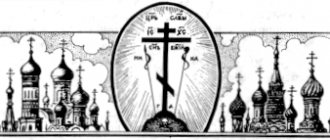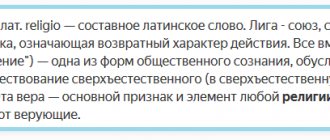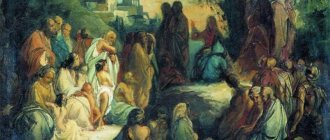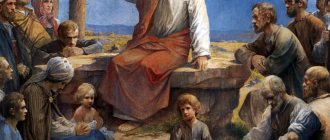Explanation of the Ten Commandments Given to Moses
Exodus 20:16. Do not bear false witness against your neighbor.
And this means:
Do not be deceitful, either to yourself or to others. If you lie about yourself, you know you are lying. But if you slander someone else, that other person knows that you are slandering him.
When you praise yourself and brag to people, people do not know that you are falsely testifying about yourself, but you yourself know it. But if you repeat these lies about yourself, people will eventually realize that you are deceiving them. However, if you constantly repeat the same lies about yourself, people will know that you are lying, but then you yourself will begin to believe your own lies. So the lie will become the truth for you, and you will get used to the lie, like a blind man gets used to darkness.
When you slander another person, that person knows that you are lying. This is the first witness against you. And you know that you are slandering him. This means that you are a second witness against yourself. And the Lord God is the third witness. Therefore, whenever you bear false witness against your neighbor, know that three witnesses will testify against you: God, your neighbor, and yourself. And rest assured, one of these three witnesses will expose you to the whole world.
This is how the Lord God can expose false testimony against one's neighbor.
There is a parable about a slanderer.
In one village lived two neighbors, Luka and Ilya. Luka could not stand Ilya, because Ilya was a correct, hard-working person, and Luka was a drunkard and a lazy man. In a fit of hatred, Luke went to court and reported that Ilya had spoken abusive words to the king. Ilya defended himself as best he could, and in the end, turning to Luke, he said: “God willing, the Lord Himself will reveal your lies against me.” However, the court sent Ilya to prison, and Luke returned home.
As he approached his house, he heard crying in the house. From a terrible premonition the blood froze in his veins, for Luke remembered Elijah’s curse. Entering the house, he was horrified. His old father fell into a fire and burned his entire face and eyes. When Luke saw this, he was speechless and could neither speak nor cry. At dawn the next day, he went to court and admitted that he had slandered Ilya. The judge immediately released Ilya, and punished Luka for perjury. So Luke suffered two punishments for one sin: both from God and from people.
Here is an example of how your neighbor can expose your false testimony.
In Nice there lived a butcher named Anatole. A certain rich but dishonest merchant bribed him to give false testimony against his neighbor Emil, that he, Anatole, saw how Emil poured kerosene and set fire to the house of this merchant. And Anatole testified to this in court and swore an oath. Emil was convicted. But he swore that when he served his sentence, he would live only to prove that Anatole had perjured himself.
Coming out of prison, Emil, being a efficient man, soon accumulated a thousand Napoleons. He decided that he would give this entire thousand to force Anatole to admit to witnesses his slander. First of all, Emil found people who knew Anatole and made such a plan. They were supposed to invite Anatole to dinner, give him a good drink and then tell him that they needed a witness who would testify under oath at the trial that a certain innkeeper was sheltering the robbers.
The plan was a great success. Anatole was told the essence of the matter, laid out a thousand gold Napoleons in front of him and asked if he could find a reliable person who would show what they needed at the trial. Anatole's eyes lit up when he saw a pile of gold in front of him, and he immediately declared that he would take on this matter himself. Then his friends pretended to doubt whether he would be able to do everything right, whether he would be afraid, whether he would not be confused at the trial. Anatole began to ardently convince them that he could do it. And then they asked him if he had ever done such things and how successfully? Unaware of the trap, Anatole admitted that there was a case when he was paid for false testimony against Emil, who as a result was sent to hard labor.
Having heard everything they needed, the friends went to Emil and told him everything. The next morning, Emil filed a complaint with the court. Anatole was tried and sent to hard labor. Thus, the inevitable punishment of God overtook the slanderer and restored the good name of a decent person.
Here is an example of how a false witness himself confessed to his crime.
In one town there lived two guys, two friends, Georgy and Nikola. Both were unmarried. And both fell in love with the same girl, the daughter of a poor artisan, who had seven daughters, all unmarried. The eldest was called Flora. It was this Flora that both friends were looking at. But Georgy turned out to be faster. He wooed Flora and asked his friend to be the best man. Nikola was overcome with such envy that he decided to prevent their wedding at all costs. And he began to dissuade George from marrying Flora, because, according to him, she was a dishonest girl and went out with many people. His friend’s words struck George like a sharp knife, and he began to assure Nikola that this could not be true. Then Nikola said that he himself had a relationship with Flora. George believed his friend, went to her parents and refused to marry. Soon the whole city knew about it. A shameful stain fell on the whole family. The sisters began to reproach Flora. And she, in despair, unable to justify herself, threw herself into the sea and drowned.
About a year later, Nikola went to church on Maundy Thursday and heard the priest calling parishioners to communion. “But let thieves, liars, oathbreakers and those who besmirched the honor of an innocent girl not approach the Chalice. It would be better for them to take fire into themselves than the Blood of the pure and innocent Jesus Christ,” he concluded.
Hearing such words, Nikola trembled like an aspen leaf. Immediately after the service, he asked the priest to confess him, which the priest did. Nikola confessed everything and asked what he should do to save himself from the reproaches of a bad conscience, which was gnawing at him like a hungry lioness. The priest advised him, if he was truly ashamed of his sin and afraid of punishment, to tell about his offense publicly, through the newspaper.
Nikola did not sleep the whole night, gathering all his courage to repent publicly. The next morning he wrote about everything he had done, namely, how he had cast a disgrace on the venerable family of a decent artisan and how he had lied to his friend. At the end of the letter he wrote: “I will not go to trial. The court will not condemn me to Death, but I only deserve death. Therefore, I sentence myself to death.” And the next day he hanged himself.
“Oh, Lord, Righteous God, how miserable are people who do not follow Your holy commandment and do not bridle their sinful heart and their tongue with an iron bridle. God, help me, a sinner, not to sin against the truth. Make me wise with Your truth, Jesus, Son of God, burn away all the lies in my heart, like a gardener burns the nests of caterpillars on the fruit trees in the garden. Amen".
The Beatitudes. What is their meaning and difference from the Old Testament commandments
Estimated reading time: 12 min.
When it comes to Christian commandments, these words usually mean what is known to everyone: “I am the Lord thy God <...> thou shalt have no other gods; do not make yourself an idol; Do not take the name of the Lord in vain...” However, these commandments through Moses were given to the people of Israel one and a half thousand years before the birth of Christ.
In Christianity, there is a different code of relations between man and God, which is usually called the Beatitudes (Matthew 5:3-12), about which modern people know much less than about the Old Testament commandments. What is their meaning? What kind of bliss are we talking about? And what is the difference between the Old Testament and New Testament commandments? We talked about this with professor of the Moscow Theological Academy Alexei Ilyich Osipov.
— Today the word “bliss” for many means the highest degree of pleasure. Does the Gospel presuppose precisely this understanding of this word or does it give it some other meaning?
— In the patristic heritage there is one common thesis, found in almost all the Fathers: if a person views Christian life as a way to achieve some heavenly pleasures, ecstasies, experiences, special states of grace, then he is on the wrong path, on the path of delusion. Why are the holy fathers so unanimous on this issue? The answer is simple: if Christ is the Savior, therefore, there is some kind of great trouble from which we all need to be saved, then we are sick, we are in a state of death, damage and spiritual darkness, which does not give us the opportunity to achieve that blissful union with God, which we call the Kingdom of God. Therefore, the correct spiritual state of a person is characterized by his desire for healing from all sin, from everything that prevents him from achieving this Kingdom, and not by the desire for pleasure, even heavenly.
As Macarius the Great said, if I’m not mistaken, our goal is not to receive something from God, but to unite with God Himself. And since God is Love, then union with God introduces us to that highest thing that in human language is called love. There is simply no higher state for a person.
Therefore, the very word “bliss” in this context means communion with God, who is Truth, Being, Love, the highest Good.
—What is the fundamental difference between the commandments of the Old Testament and the Beatitudes?
— All the Old Testament commandments are of a prohibitive nature: “Thou shalt not kill,” “Thou shalt not steal,” “Thou shalt not covet”... They were designed to keep a person from violating the Will of God. The Beatitudes have a different, positive character. But they can only conditionally be called commandments. Essentially, they are nothing more than an image of the beauty of the properties of that person whom the Apostle Paul calls new. The beatitudes show what spiritual gifts the new man will receive if he follows the way of the Lord. The Decalogue of the Old Testament and the Sermon on the Mount of the Gospel are two different levels of spiritual order. The Old Testament commandments promise a reward for their fulfillment: so that your days on earth will be prolonged. The beatitudes, without canceling these commandments, raise a person’s consciousness to the true goal of his existence: they will see God, for beatitude is God Himself. It is no coincidence that such an expert on Scripture as St. John Chrysostom says: “The Old Testament is as distant from the New as earth is from heaven.”
We can say that the commandments given through Moses are a kind of barrier, a fence on the edge of an abyss, holding back the beginning. And beatitudes are an open prospect of life in God. But without fulfilling the first, the second, of course, is impossible.
—What are “poor in spirit”? And is it true that the ancient texts of the New Testament simply say: “Blessed are the poor,” and the word “by the spirit” is a later insertion?
— If we take the edition of the New Testament in ancient Greek by Kurt Aland, where interlinear references are given to all the discrepancies that were found in the found manuscripts and fragments of the New Testament, then everywhere, with rare exceptions, the word “by the spirit” is present. And the very context of the New Testament speaks about the spiritual content of this saying. Therefore, the Slavic translation, and then the Russian one, contains precisely “poor in spirit” as an expression that corresponds to the spirit of the entire sermon of the Savior. And I must say that this full text has the deepest meaning.
All the holy ascetic fathers constantly and persistently emphasized that it is the awareness of one’s spiritual poverty that is the basis of the spiritual life of a Christian. This poverty consists in a person’s vision, firstly, of the damage to his nature by sin, and secondly, the impossibility of healing it on his own, without God’s help. And until a person sees this poverty of his, he is incapable of spiritual life. Poverty of spirit in its essence is nothing more than humility. How it is acquired is briefly and clearly discussed, for example, by Rev. Simeon the New Theologian: “Careful fulfillment of the commandments of Christ teaches a person his weaknesses,” that is, reveals to him the illnesses of his soul. The saints claim that without this foundation no other virtues are possible. Moreover, the virtues themselves, without spiritual poverty, can lead a person into a very dangerous state, into vanity, pride and other sins.
- If the reward for poverty of spirit is the Kingdom of Heaven, then why are the other blessings needed, since the Kingdom of Heaven already presupposes the fullness of good?
“Here we are not talking about a reward, but about the necessary condition under which all further virtues are possible.” When we build a house, we first lay the foundation, and only then build the walls. In spiritual life, humility—spiritual poverty—is the foundation without which all good deeds and all further work on oneself becomes meaningless and useless. St. said this beautifully. Isaac the Syrian: “What salt is to all food, humility is to every virtue... because without humility all our deeds, all virtues and all work are in vain.” But, on the other hand, spiritual poverty is a powerful incentive for correct spiritual life, the acquisition of all other god-like properties and, thus, the fullness of good.
—Then the next question is: are the Beatitudes hierarchical and are they some kind of system, or is each of them completely self-sufficient?
“We can say with complete confidence that the first step is the necessary basis for obtaining the rest. But the enumeration of others does not at all have the character of some logically connected strict system. In the Gospels of Matthew and Luke themselves, they have a different order. This is also evidenced by the experience of many saints, who have different sequences of acquiring virtues. Each saint had some special virtue that set him apart from others. Someone was a peacemaker. And some are especially merciful. This depended on many reasons: on the natural properties of the individual, on the circumstances of external life, on the nature and conditions of achievement, and even on the level of spiritual perfection. But, I repeat, the acquisition of spiritual poverty, according to the teachings of the fathers, has always been considered as an unconditional requirement, since without it, the fulfillment of the remaining commandments leads to the destruction of the entire spiritual home of a Christian.
The Holy Fathers give sad examples when some ascetics who achieved great talents were able to heal, see the future, and prophesy, but then fell into the gravest sins. And the fathers directly explain: all this happened because they, without recognizing themselves, that is, their sinfulness, their weakness in the feat of cleansing the soul from the action of passions, in other words, without acquiring spiritual poverty, were easily subjected to devilish attacks, stumbled and fell.
- Blessed are those who mourn. But people cry for different reasons. What kind of crying are we talking about?
— There are many types of tears: we cry from resentment, we cry from joy, we cry from anger, we cry from some kind of sorrow, we cry from misfortune. These types of crying can be natural or even sinful.
When the holy fathers explain Christ’s blessing of those who cry, they speak not about these reasons for tears, but about tears of repentance, heartfelt contrition for their sins, about their powerlessness to cope with the evil that they see in themselves. Such crying is an appeal of both the mind and the heart to God for help in spiritual life. But God will not reject a contrite and humble heart and will certainly help such a person to overcome evil in himself and acquire goodness. Therefore, blessed are these who mourn.
“Blessed are the meek, for they will inherit the earth.” What does it mean? In the sense that all the meek will eventually kill each other, and only the meek will remain on earth?
- First of all, it is necessary to explain what meekness is. Saint Ignatius (Brianchaninov) wrote: “The state of the soul in which anger, hatred, resentment and condemnation are eliminated from it is a new bliss, it is called meekness.” Meekness, it turns out, is not some kind of passivity, weak character, or inability to repel aggression, but generosity, the ability to forgive the offender, and not retaliate with evil for evil. This property is completely spiritual, and it is a characteristic of a Christian who has conquered his egoism, conquered the passions, especially anger, that push him to revenge. Therefore, such a person is capable of inheriting the promised land of the Kingdom of Heaven.
At the same time, the holy fathers explained that here we are not talking about this, our earth, filled with sin, suffering, blood, but about that earth, which is the abode of the eternal future life of man - the new earth and the new heaven, about which the Apostle John the Theologian writes in his Apocalypse.
- Blessed are the merciful, for they will receive mercy. That is, it turns out that God treats the merciful differently than the unmerciful. Does He have mercy on some and not on others?
— It would be a mistake to understand the word “pardoned” in a legal sense or to believe that God, having anger at man, but seeing his mercy towards people, turned His anger into mercy. There is no judicial pardon of the sinner, no change in God's attitude towards him for his kindness. Rev. Anthony the Great explains this perfectly: “It is absurd to think that the Divine would be good or bad because of human affairs. God is good and does only good things, being always the same; and when we are good, we enter into communication with God - out of similarity with Him, and when we become evil, we separate from God - out of dissimilarity with Him.
By living virtuously, we become God's people, and by becoming evil, we become rejected from Him; and this does not mean that He has anger against us, but that our sins do not allow God to shine in us, but unite us with demons tormentors. If we then gain permission from our sins through prayers and acts of kindness, this does not mean that we have pleased God and changed Him, but that through such actions and our turning to God, having healed the evil that exists in us, we again become able to taste God’s goodness; so to say: God turns away from the wicked is the same as saying: the sun is hidden from those deprived of sight.”
That is, pardon here does not mean a change in God’s attitude towards man for his mercy, but this mercy towards his neighbor makes the person himself capable of perceiving the unchanging love of God. This is a logical and natural process - like connects with like. The closer a person becomes to God through his mercy towards his neighbors, the more God’s mercy he becomes able to accommodate.
—Who are the pure in heart and how are they able to see God, who is the Spirit and about whom it is said: no one has seen God?
— By “pure heart,” the holy fathers understand the possibility of achieving dispassion, that is, liberation from slavery to passions, for everyone who commits sin, according to the word of Christ, is a slave of sin. So, as a person frees himself from this slavery, he truly becomes more and more a spiritual spectator of God. Just as we experience love, we see it in ourselves, so, similarly, a person can see God - not with external vision, but with the internal experience of His presence in his soul, in his life. How beautifully the Psalmist speaks about this: taste and see that the Lord is good!
— Blessed are the peacemakers—who is this said about? Who are the peacemakers and why are they promised bliss?
— These words have at least two conjugate meanings. The first, more obvious, concerns our mutual relations with each other, both personal and collective, social, international. Those who unselfishly strive to establish and maintain peace are blessed, even if this is associated with any infringement of their pride, vanity, etc. This peacemaker, in whom love overcomes his often petty truth, is pleased with Christ.
The second meaning, a deeper one, applies to those who, through the feat of struggle against passions, cleansed their hearts from all evil and became able to accept into their souls that peace about which the Savior said: My peace I give to you; not as the world gives, I give to you. This peace of soul is glorified by all the saints, claiming that whoever acquires it acquires true sonship with God.
- Well, the last question - expelled for the sake of truth. Isn’t there a certain danger here for a modern person - to confuse your personal problems, which caused unpleasant consequences for you, with persecution for Christ and the truth of God?
- Of course, this danger exists. After all, there is no good thing that cannot be spoiled. And in this case, all of us (each to the extent of his susceptibility to passions) are sometimes inclined to consider ourselves persecuted for that truth, which is not at all the truth of God. There is an ordinary human truth, which, as a rule, is, expressed in mathematical language, the establishment of the identity of relations: two and two are four. This truth is nothing more than the right to justice. V. Solovyov very precisely said about the moral level of this right: “Right is the lowest limit or a certain minimum of morality.” Expulsion for this truth, if we compare this with the modern context of the struggle for freedoms and human rights, it turns out that this is not the highest dignity of a person, for here, along with sincere aspirations, vanity, calculation, political considerations, and other, not always disinterested, often appear , motives.
What kind of truth did the Lord speak about when he promised the Kingdom of Heaven to those exiled for it? Saint Isaac the Syrian wrote about her: “Mercy and justice in one soul are the same as a person who worships God and idols in the same house. Mercy is the opposite of justice. Justice is an equalization of the exact measure: because it gives to everyone what he deserves... And mercy... compassionately bows to everyone: whoever is worthy of evil is not repaid with evil, and whoever is worthy of good, he is filled with abundance... Like hay and fire, they cannot stand to be in one house, so justice and mercy are in one soul.”
There is a good saying: “Demanding your rights is a matter of truth, sacrificing them is a matter of love.” God's truth exists only where there is love. Where there is no love, there is no truth. If I tell a person with an ugly appearance that he is a freak, then technically I will be right. But there will be no God's truth in my words. Why? Because there is no love, no compassion. That is, God’s truth and human truth are often completely different things. Without love there is no truth, even if everything seems quite fair. And, on the contrary, where there is not even justice, but there is real love, condescending to the shortcomings of one’s neighbor, showing patience, true truth is present.
Saint Isaac the Syrian cites God Himself as an example: “Do not call God just, for His justice is not known by your deeds... moreover, He is good and gracious. For he says, “It is good for the wicked and the wicked (Luke 6:35).” The Lord Jesus Christ, being a righteous man, suffered for the unrighteous and prayed from the Cross: Father! forgive them, for they do not know what they are doing. It turns out that this is the kind of truth one can and should suffer for—for love of man, of truth, of God. Only in this case will those persecuted for the sake of righteousness inherit the Kingdom of Heaven.
Calligraphy by Marina MARYINA
Continuing the topic, read:
The Beatitudes. Those who performed them
Ten Commandments of the Old Testament
(Ex. 20:2-17; Deut. 5:6-21)
- I am the Lord your God, and there are no other gods besides Me.
- Do not make for yourself an idol or any image; do not worship them or serve them.
- Do not take the name of the Lord your God in vain.
- Six days you shall work and do all your work, and the seventh—Sabbath—is a day of rest, which you shall dedicate to the Lord your God.
- Honor your father and mother, may you be blessed on earth and have long life.
- Thou shalt not kill.
- Don't commit adultery.
- Don't steal
- Don't bear false witness.
- Don't covet anything that belongs to others.










